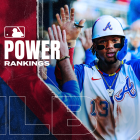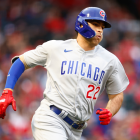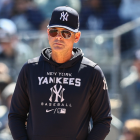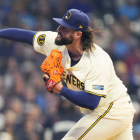Heading into Wednesday's Game 5 of the National League Championship Series, the Milwaukee Brewers were expected to start left-handed pitcher Wade Miley. Sure enough, Miley took the mound when the bottom of the first rolled around. He walked leadoff hitter Cody Bellinger, and that's when things got weird. Rather than go to work against the next batter, Miley looked to the dugout as Brewers skipper Craig Counsell trotted out, motioned to the bullpen, and made a pitching change, calling upon right-hander Brandon Woodruff.
No, Miley wasn't hurt. No, Counsell hadn't lost it. Instead, the Brewers were executing a plan that saw them attempt to use the Los Angeles Dodgers' platoon-heavy strategy against them:
Removing Miley was Brewers’ plan. He will start Game 6.
— Ken Rosenthal (@Ken_Rosenthal) October 17, 2018
The Dodgers tend to allow the opposition's starter to inform their lineup decisions. For instance, in Game 2 the Dodgers started eight right-handed position players against Miley. In other games in the series, they've swapped out parts, depending on match-ups. By starting Miley, the Brewers were hoping the Dodgers would again run eight righties out there -- only to flip the script and bring in a right-handed pitcher, thus gaining an edge either by virtue of having the platoon advantage more often or forcing the Dodgers to burn their left-handed-heavy bench.
The plan wasn't as effective as it could have been, in part because Roberts didn't use the same lineup as he did in Game 2. This time, Roberts started Max Muncy and Cody Bellinger, both lefties -- perhaps betting the Brewers would have a quick hook on Miley.
Miley, by the way, is now set to start Game 6, which will make him the first pitcher in nearly 90 years to start consecutive playoff games:
The last pitcher to start back-to-back team games in the same #postseason series was George Earnshaw in the 1930 World Series.
— Stats By STATS (@StatsBySTATS) October 17, 2018
After tossing 7 shutout innings in Game 5, Earnshaw pitched a complete game two days later, allowing one run to win Game 6 and the series. https://t.co/KCuX9U0z2t
After the game, a Brewers loss, Miley said he knew about the plan -- but wouldn't question it because it's not his place. Woodruff, for his part, suspected something was up when he didn't warm during Game 4. He learned about the plan in its full glory on Wednesday morning.
It's worth noting that the Dodgers themselves had floated doing something similar earlier in the series. The Dodgers' motivation was based on the perception that the Brewers were taking liberties with how long they were taking to name their starting pitcher. Here's what Ken Rosenthal of the Athletic wrote at the time:
Nothing would prevent the Dodgers, for example, from refusing to name a starter for a particular game, then warming up two options and picking one. A Dodgers official mentioned the possibility of just such a move Thursday, but the team would only seriously consider it if L.A. perceived the Brewers to be seeking a competitive advantage, which would not be the case in Games 1 and 2.
Of course, the Brewers could just be history buffs, too, as Baseball Prospectus's Jarrett Seidler noted:
Bucky Harris successfully did this to John McGraw in 1924 https://t.co/2aIMqBgWfy
— Jarrett Seidler (@jaseidler) October 17, 2018
Indeed, Bucky Harris of the Washington Senators started a right-hander (Curly Odgen) and permitted him to face two batters in Game 7 of the 1924 World Series before pulling the plug and inserting a southpaw (George Mogridge) in order to gain the platoon advantage. It worked, with Mogridge pitching fine and the Senators winning the game.
Whatever inspired the Brewers, it's clear that they intend to use every trick in the book in order to punch their ticket to the World Series.






















